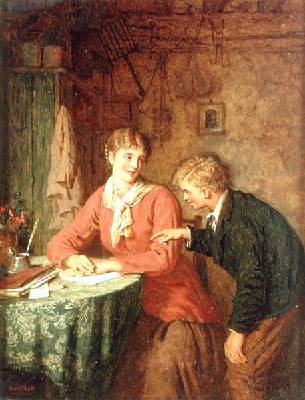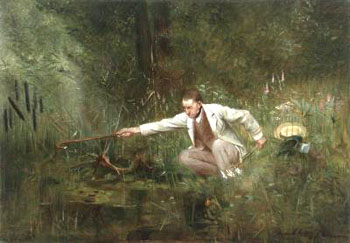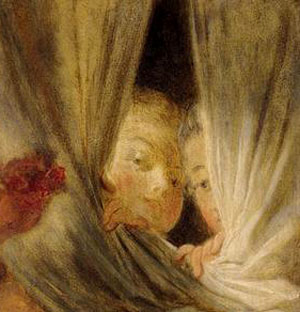 |
Formation of Children
Good and Bad Curiosity
Marian T. Horvat, Ph.D.
I am quite surprised at some of the chapter titles of our Small Manual of Civility. Who would expect a manners book to address curiosity? But the Catholic authors of this Manual for young men understood human nature quite well. A man’s curiosity – not a bad thing in itself – can lead to much wasted time and even a wasted life if he does not govern and direct it. In Chapter 12, The Manual reminds us that in the end, each one will answer before God for time wasted in idle curiosity.
In a milieu like the Catholic traditionalist movement, it is very easy to become over-curious in the bad sense. That is, to spend more time watching the mundane actions of this or that person, always seeking the latest gossip or scandal, rather than applying oneself seriously to the fight against Progressivism in the Church. In this fight, at this hour in History, much is at stake.
Curiosity – bad and good
Curiosity is the human tendency to know everything, good or bad, about a person or thing.
Curiosity is bad first, when it is indiscreet. We have already discussed discretion before. Indiscretion, a fault that is committed above all with the eyes, can be likened to stealing the goods of others. It is indiscreet to read the letters of other persons without permission, to examine the contents of the drawers or closets of a person, to look at, read or peruse someone’s papers or notes left on the desk or atop a work table.
When curiosity is bad

A mother instructs her son not to pry into her private letters |
It would also be indiscretion to listen to the phone conversations of others, or in our technical age, to open e-mails or enter the private computer files of others. This would, of course, exclude the cases of parents who must monitor the use of computers at home for the sake of the healthy spiritual formation of children and youth.
Curiosity is bad, second, when it is scandalous. It is scandalous when one looks at what is indecent, be it at the theater or movies, or in photographs, books, magazines, and so on. Today we must include at the top of that list the obscene pictures plenteously found on the Internet. Looking at such things is morally sinful.
Curiosity is bad, third, when it suggests purchasing pernicious books containing doctrine against the Faith and good customs. Love romances are also dangerous traps by which the Devil snatches uprightness and purity of customs from souls, especially women.
Curiosity is bad, fourth, when it is idle. Idle curiosity consists in the blinding desire for novelties of all types: from political news to the latest scandals or romantic entanglements of neighbors or movie stars. It is idle because the person obsessed by such things looks at everything without seeing anything, without fixing his attention on immediate, proximate things. The only aim of this curiosity is to offer new information to others who have the same defect. Their conversation always starts with the eager question: “Did you hear the latest?” Then he pours his futile information into the ears of his companions.
When curiosity is good

The botanist has a curiosity to know and understand
the world of Nature. |
Curiosity is good and praiseworthy, first, when it is natural, being a free, discreet expansion of the reasonable desire to know the persons and things that surround a man.
Second, when it is scientific, guided by prudence and Catholic teaching, and animated by the noble penchant to penetrate the mysteries of beings and things, of studying the causes and laws that govern them with the aim of successfully interpreting the grand book of Nature.
A good and praiseworthy curiosity was found in Andre Ampère who made great contributions to mathematics and chemistry, Alessandro Volta, inventor of the voltaic battery, Louis Galvani, another great Catholic contributor to the science of current electricity, Louis Pasteur, famous for his breakthroughs in microbiology, and other great learned men of science who were, at the same time, men of faith. Clearly, scientific curiosity is the condition for discoveries.
Curiosity can occupy all your time
There are men who are curious to learn in order to acquire knowledge that enriches their minds. There are others curious to know the habits and lives of their neighbors. The first quality is as praiseworthy as the second is detestable.

Curiosity, by Jean-Honoré Fragonard |
There are men and women who do not take part in the constructive conversation of a society. From behind a window or a curtain, they listen to private conversations, spying on the actions of others. They never miss a word, even the most indifferent, and are quick to interpret everything as they see fit. If they seek out or visit a person, it is not in order to give him pleasure. Rather, it is to find out what he is doing or see what new information he might provide.
A man with the vice of curiosity will enter the home of another, conversing and speaking amiably with the porter to see if he can glean some “inside” information from him. Likewise, he does not hesitate to make friends with the maids to hear their gossip. Entering the hall and parlor, his eyes never rest. Nothing escapes them. If the lady of the house is writing, he stretches his neck to try to catch a glimpse of a few lines.
This idle curiosity is no less present in ladies. The curious woman never lets a strand of hair pass without examining it. That is to say, she is obsessed with knowing the words actions, dressing, and lifestyles of neighbors and acquaintances. As for the government and order of her own home, she pays little care to that. From the time she rises from her bed in the morning until the moment she retires, she is consumed with discovering new tidbits about this or that person, hearing the latest scandal, or discovering the latest new trend. And all this without interruption from January 1 to December 31.
And domestic obligations? They are left aside because, the curious ones say, these things are very insignificant, unworthy of their time or attention… In fact, they are wasting their time on trifles and ignoring their duties.
One day, when they stand before God, they will have to make a strict account for their time, and then they will understand – too late! – their grave error.

Posted May 4, 2007


Related Topics of Interest
 Discretion in Words and Actions Discretion in Words and Actions
 Is Being Frank Always Advisable? Is Being Frank Always Advisable?
 The Voice - Speaking and Conversing The Voice - Speaking and Conversing
 The Art of Governing the Hands and Feet The Art of Governing the Hands and Feet
 The Importance of the Greeting The Importance of the Greeting
 The Smile, The Laugh, The Grimace The Smile, The Laugh, The Grimace
 Cleanliness and Good Hygiene Cleanliness and Good Hygiene
 The Eyes and the Gaze The Eyes and the Gaze
 Order in the Professional Life Order in the Professional Life
 Order and the Spirit of Order Order and the Spirit of Order

Related Works of Interest
|
|
Formation | Cultural | Home | Books | CDs | Search | Contact Us | Donate

© 2002- Tradition in Action, Inc. All Rights Reserved
|
 |
|